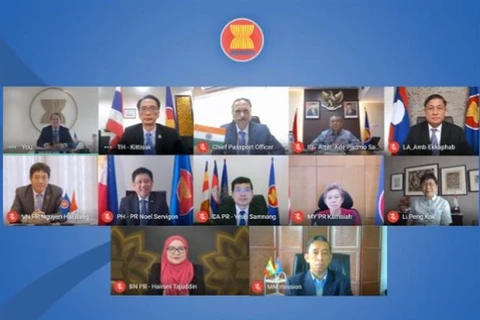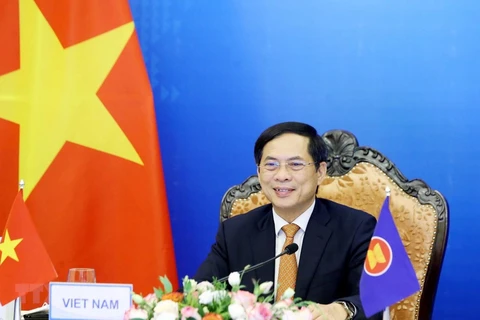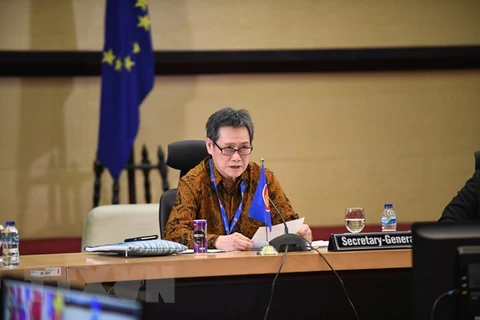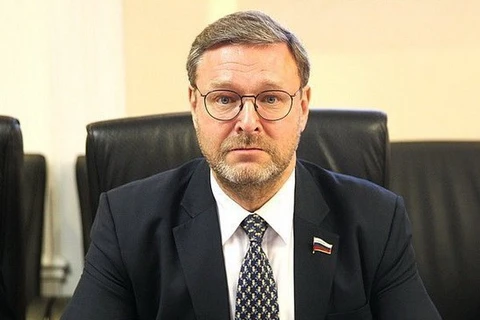New Delhi (VNA) - The ASEAN Studies Centre of ISEAS - Yusof Ishak Institute in New Delhi and the ASEAN-India Centre at the Research and Information System for Developing Countries (RIS) launched their first joint programme entitled “ASEAN-India Development Partnership Programme (AIDPP),” a training and capacity building programme for scholars and practitioners of ASEAN countries and India.
The programme, aiming to strengthen the people-to-people and institutional linkages between India and ASEAN, is an activity towards the 30th anniversary of their relations in 2022 which will be designated as the “ASEAN-India Friendship Year.”
Held virtually from August 16-20, this week-long training programme comprised lectures by eminent scholars on various facets of ASEAN-India relations.
In his inaugural remarks, Vivash Vidu Sapkal, Joint Secretary (South) of India’s Ministry of External Affairs, said the ASEAN-India strategic partnership lies on a strong foundation of the shared historical, geographical and civilizational ties. “This relationship has gone beyond its cultural and economic dimensions. India and ASEAN share the pluralistic natures of our societies encompassing many religions of the world and its diverse cultures”, he added.
Prof Sachin Chaturvedi, Director General of the RIS, said that in the post-COVID era, ASEAN and India have to work in a collaborative manner for the successful realization of the Sustainable Development Goals (SGDs); and that fintech is the new way forward for vast strategic initiatives.
Choi Shing Kwok from ISEAS - Yusof Ishak Institute highlighted the warm, robust, and mutually beneficial ties cultivated by ASEAN and India over the past three decades, their fruitful partnership in ASEAN-led mechanisms as well as their strong commitment to multilateralism and regionalism for advancing peace and stability in the region.
Notwithstanding this, the full potential of relations has not been realized, he said, adding that the conditions for deeper engagement between ASEAN and India have changed. In the face of the changing global geo-strategic environment, particularly the US-China competition, and the economic impact of the COVID-19 pandemic, ASEAN and India are now poised for rapid and accelerated progress in further deepening their engagement.
Both parties, he continued, can look to augment India’s security and strategic presence in Southeast Asia to reinforce norms and values that are deeply held by their peoples.
India is expected to remain an important strategic partner for ASEAN for the decades ahead, he noted.
Sponsored by the Ministry of External Affairs of India, this five-day training programme included lectures on ASEAN-India relations and strategic imperatives, the deepening of ASEAN-India trade integration and the changing profile of ASEAN-India investment relations and B2B engagements, multilateralism in the post COVID-19 world, ASEAN-India in the Indo-Pacific region, and issues on ASEAN-India production networks in the face of the shifting global supply chains./.
Held virtually from August 16-20, this week-long training programme comprised lectures by eminent scholars on various facets of ASEAN-India relations.
In his inaugural remarks, Vivash Vidu Sapkal, Joint Secretary (South) of India’s Ministry of External Affairs, said the ASEAN-India strategic partnership lies on a strong foundation of the shared historical, geographical and civilizational ties. “This relationship has gone beyond its cultural and economic dimensions. India and ASEAN share the pluralistic natures of our societies encompassing many religions of the world and its diverse cultures”, he added.
Prof Sachin Chaturvedi, Director General of the RIS, said that in the post-COVID era, ASEAN and India have to work in a collaborative manner for the successful realization of the Sustainable Development Goals (SGDs); and that fintech is the new way forward for vast strategic initiatives.
Choi Shing Kwok from ISEAS - Yusof Ishak Institute highlighted the warm, robust, and mutually beneficial ties cultivated by ASEAN and India over the past three decades, their fruitful partnership in ASEAN-led mechanisms as well as their strong commitment to multilateralism and regionalism for advancing peace and stability in the region.
Notwithstanding this, the full potential of relations has not been realized, he said, adding that the conditions for deeper engagement between ASEAN and India have changed. In the face of the changing global geo-strategic environment, particularly the US-China competition, and the economic impact of the COVID-19 pandemic, ASEAN and India are now poised for rapid and accelerated progress in further deepening their engagement.
Both parties, he continued, can look to augment India’s security and strategic presence in Southeast Asia to reinforce norms and values that are deeply held by their peoples.
India is expected to remain an important strategic partner for ASEAN for the decades ahead, he noted.
Sponsored by the Ministry of External Affairs of India, this five-day training programme included lectures on ASEAN-India relations and strategic imperatives, the deepening of ASEAN-India trade integration and the changing profile of ASEAN-India investment relations and B2B engagements, multilateralism in the post COVID-19 world, ASEAN-India in the Indo-Pacific region, and issues on ASEAN-India production networks in the face of the shifting global supply chains./.
VNA

























